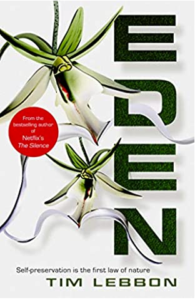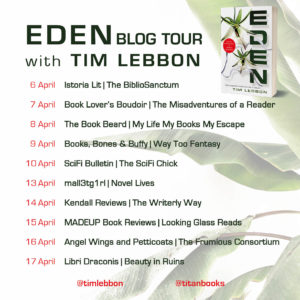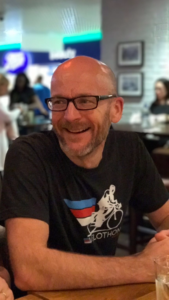Q. Every book has its own story about how it came to be conceived and written as it did. How did Eden evolve? (No pun intended, but since I like puns, I’m leaving it in there anyway.)
A. Ha! I like it. Well, I can remember when the notion of Eden hit me, and I still have the notebook I snapped up and started scribbling with notes. I was in New York towards the end of a great trip visiting set of The Silence (in Toronto), staying with Christopher Golden (near Boston), and finally a couple of days of meetings and sightseeing in NY. I was in my room after a nice meal and a few drinks with my agent, and the idea of Eden hit me all at once––the landscape, the adventure racers, the idea of nature establishing itself again. It wasn’t quite that ‘whole novel in one idea’ moment that some writers talk about, but it was the basic concept and theme, and from there I built the rest of the novel. Subconsciously it was writing a novel based on something I love (endurance sport) and something that frightens me (climate change). Sometimes, bringing two ideas or themes together can really help.
 Q. Though written as an action-adventure gone wrong, Eden is a thoughtful look at the future of our planet’s ecology, positing plausible solutions to modern day problems. Are there any particular audiences you hope will connect with this story? That said, do you write with any particular audience in mind?
Q. Though written as an action-adventure gone wrong, Eden is a thoughtful look at the future of our planet’s ecology, positing plausible solutions to modern day problems. Are there any particular audiences you hope will connect with this story? That said, do you write with any particular audience in mind?
A. I don’t really write with an audience in mind. I write the novel I want to read, and my hope is I’m one of many! I always hope my work will find an audience, and over the years I have probably built a small core of readers who like most of my work. But at the same time I try not to restrict myself to ‘what my readers might want or expect next’. I hope Eden will find a good audience because I think it’s one of my best novels, but that’s pretty much out of my hands now. And in the era of Coronavirus and lockdown, the fate of a newly released novel is hazy at best.
Q. Are you a pantser (someone who writes by the seat of their pants) or a plotter?
A. More a pantser than a plotter. Although each project is different. If I’m collaborating on a novel we’ll tend to plan a bit more first. My current new novel (tentative title: Fall), I planned quite a bit before starting writing, but it’s curious that I’ve only looked at the plan notes a few times even though I’m 50,000 words in. I think for me, even writing lots of notes on a novel is just me mentally circling before I start in, and not necessarily me actually planning. It’s … complicated, I guess! Generally though I much prefer the more organic approach––set sail and see where the ship take me.
Q. It’s known that you keep a fairly structured schedule for your daily writing, focusing on words from 9 to 2, then the less creative side of the business for the rest of your work day. Do you have any tips for authors trying to adopt a similar framework?
A. Honesty, everyone is different. I have a friend who does social media and business in the morning, coffee at 11, lunch, then starts work early afternoon and works into the evening. I have another friend who writes from 7am and is finished by midday. My approach suits me and my family, but if I had TOTAL freedom I’d likely get up, make tea and start by 7:30. The longer a day goes without me getting some words down, the tougher I find it. I love writing … but I find it really f•••••g hard, too. And sometimes there are many distractions to tear me away from the page.
Q. With COVID-19 upending the daily lives of millions, if not more, how are you coping with living in what feels like it could be the preamble to one of your own novels?
A. Shit, if I had a fiver for everyone who’s said ‘This is like living in one of your books Tim!’ I’d never have to write another one. Well, I’ve got my wife working at home, my son home from school, my daughter home from uni. We don’t have a huge house, so we tend to move around a bit during the day, finding spaces to work. Some days I’m in my office, other days in our garden cabin, other days in our bedroom. The first few days before and after lockdown I had real trouble concentrating, due to a constant low level of dread and anxiety. That’s still there, but I’ve managed to start writing again (on the novel, a TV pitch, a new novella with Christopher Golden … having several projects on the go works well for me). I have realised just today that the situation is feeding into my novel, not really in subject matter, but making my writing a bit more … contemplative.
Q. In addition to the publication of Eden, you’ve had a busy year with the Netflix movie adaptation of The Silence as well as the launch of your career in concert promotion (and congratulations on all of it, by the way!) What can you tell us about your next project?
 A. I have a Firefly novel, Firefly: Generations, out from Titan at the end of this year (unless pub date changes due to the pandemic). Other than that, I can only drop hints about future projects, because nothing’s been announced yet! So, I had a very exciting video conference call with people in LA yesterday about a TV series in development. That’s quite advanced, and I’d love to announce but can’t until it’s official from them. There’s another TV project at early stages of planning, the new novel Fall, a new novella with Christopher Golden (we’re writing it on spec, not sold yet), and several other fun projects. In fact, only today I’ve been discussing a new collaborative novel with another friend. All exciting stuff, so watch this space.
A. I have a Firefly novel, Firefly: Generations, out from Titan at the end of this year (unless pub date changes due to the pandemic). Other than that, I can only drop hints about future projects, because nothing’s been announced yet! So, I had a very exciting video conference call with people in LA yesterday about a TV series in development. That’s quite advanced, and I’d love to announce but can’t until it’s official from them. There’s another TV project at early stages of planning, the new novel Fall, a new novella with Christopher Golden (we’re writing it on spec, not sold yet), and several other fun projects. In fact, only today I’ve been discussing a new collaborative novel with another friend. All exciting stuff, so watch this space.
Q. Should Eden follow in the footsteps of The Silence, do you have any casting suggestions in mind for Jenn, Dylan, Kat and crew?
A. Wow, I always find these questions really tough. I generally don’t describe my characters in great detail because as a reader, I always imagine how a character looks. I’ll choose one: Dylan would be Liam Neeson.
Q. Your love of adventure racing shines through in the pages of Eden. Do you think you would have been able to write this novel before you began developing your own interest in triathlons a little under a decade ago?
A. Yes, but it wouldn’t have had the authenticity. I know what it’s like to run long distances, the pain, the discomfort, the thirst, the aches, the buzz. It would have been difficult making that up from the POV of someone who’d never run more than 5k.
Q. What is the first book you read that made you think, “I have got to write something like this someday!”
A. As a kid, probably a series of adventure novels by Willard Price. Then as a ten year old my mother gave me The Rats by James Herbert, and I never looked back. From that moment on I think I wanted to be a storyteller, and I probably started my first novel before I was into my teens. My mum gave me a love of reading, and I’ve never lost it, and that fed into me wanting to write. So it’s all my mum’s fault! Bless her.
Q. What are you reading at the moment?
A. Netherwood by my good mate Stephen Volk. He’s such a good writer, it’s almost criminal
Q. Are there any new books or authors in horror or speculative fiction that have you excited?
A. Looking forward to James Brogden’s new one, Bone Harvest. He’s a great writer. And Survivor Song by Paul Tremblay is brilliant. Also looking forward to reading The Deep, by Alma Katsu.
Q. What made you choose horror/speculative fiction as your primary means of expression?
~~~~~~~
Author Links
~~~~~~~
Eden was published in the US on April 7th, 2020 by Titan Books and may be found at all good booksellers. My review of the book itself may be found here.

